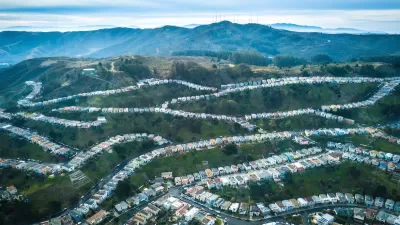The best way to improve automobiles is to improve cities, according to this article from Business Week.
"The answer to the problem of the American car is not under its hood."
"Today's cars are costly, dangerous, and an ecological nightmare. Transportation generates more than a quarter of U.S. greenhouse gases, according to the Environmental Protection Agency. A portion of that comes from moving freight around but more than 20% is personal transportation. Our vehicle emissions are a major climate change contributor, but what comes out of the tailpipe is only a fraction of the total climate impact of driving a car, and the climate impact is in turn only a part of the environmental and social damage cars cause. Improving mileage will not fix these problems."
"The best car-related innovation we have is not to improve the car but to eliminate the need to drive it everywhere we go. In the U.S,, we need to stop sprawl and build well-designed compact communities. The land-use patterns in our communities dictate not only how much we drive, but how sustainable we can be on all sorts of fronts. And sprawled-out land uses generate enormous amounts of automotive greenhouse gases. A recent major study, Growing Cooler, published by Smart Growth America, a coalition of national, state, and local organizations that addresses urban planning, makes the point clearly: If 60% of new developments were even modestly more compact, we'd emit 85 million fewer metric tons of tailpipe [car emissions] CO2 each year by 2030-as much as would be saved by raising the national mileage standards to 32 mpg."
"So we know that density reduces driving. We know we're capable of building really dense new neighborhoods with plenty of open space, welcoming public places, thriving neighborhood retail, and a tangible sense of place. Just look at Vancouver, which has redeveloped its downtown core into a dense mix of retail, jobs, and housing. Not only is the result one of the most liveable cities in North America, but 40% of all downtown Vancouver households are car-free."
Thanks to Jon Cecil, AICP
FULL STORY: Cities: A Smart Alternative to Cars

Pennsylvania Mall Conversion Bill Passes House
If passed, the bill would promote the adaptive reuse of defunct commercial buildings.

Depopulation Patterns Get Weird
A recent ranking of “declining” cities heavily features some of the most expensive cities in the country — including New York City and a half-dozen in the San Francisco Bay Area.

California Exodus: Population Drops Below 39 Million
Never mind the 40 million that demographers predicted the Golden State would reach by 2018. The state's population dipped below 39 million to 38.965 million last July, according to Census data released in March, the lowest since 2015.

Google Maps Introduces New Transit, EV Features
It will now be easier to find electric car charging stations and transit options.

Ohio Lawmakers Propose Incentivizing Housing Production
A proposed bill would take a carrot approach to stimulating housing production through a grant program that would reward cities that implement pro-housing policies.

Chicago Awarded $2M Reconnecting Communities Grant
Community advocates say the city’s plan may not do enough to reverse the negative impacts of a major expressway.
City of Costa Mesa
Licking County
Barrett Planning Group LLC
HUD's Office of Policy Development and Research
Mpact Transit + Community
HUD's Office of Policy Development and Research
City of Universal City TX
ULI Northwest Arkansas
Town of Zionsville
Urban Design for Planners 1: Software Tools
This six-course series explores essential urban design concepts using open source software and equips planners with the tools they need to participate fully in the urban design process.
Planning for Universal Design
Learn the tools for implementing Universal Design in planning regulations.























